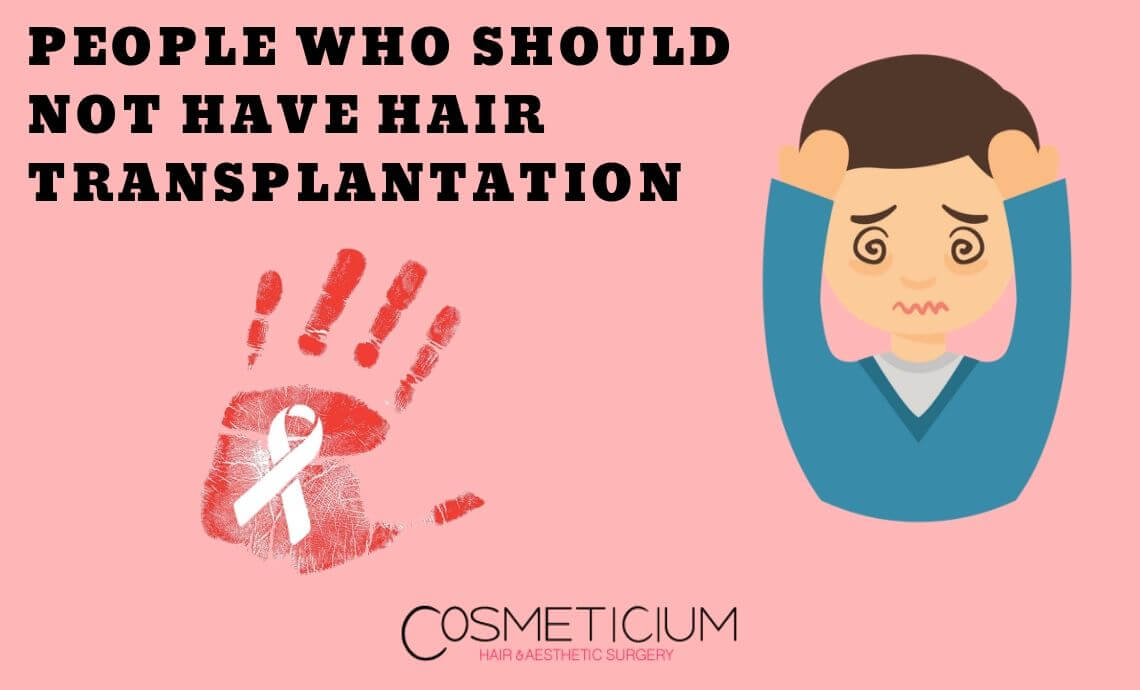Who Should Not Have Hair TransplantationThose who have lost their hair due to different reasons can regain their hair with a simple operation. Today, hair transplantation has become an extremely simple process and has started to give quite successful results. Especially with the latest methods developed, hair follicles are taken without any scars on the heads of the people and these hairs are transferred to the desired points successfully.
Although there are different methods used for hair transplantation, FUE and DHI techniques are more prominent. In DHI technique, the hair follicles are collected one by one and transferred to the pencils called Choipen and the transplanting process is carried out directly without needing to open the canal. In the FUE method, the hair follicles are collected and transferred one by one after the canal is opened.
Hair transplantation is objectionable sometimes. This is because the health of the person to have transplantation is at risk for different reasons.
What are the inconveniences of hair transplantation? Which people may not be suitable for hair transplantation? All details are in our article.
Table of Contents
1. People Having No Hair from Birth
Hair follicles necessary for hair transplantation are usually taken from the lower parts of the neck. These hair follicles are transplanted into the balding spots in more visible areas. Therefore, the hair taken from the person himself is transplanted. If the person concerned does not have hair from birth, it will not be possible to take hair follicles from the person. When hair follicles cannot be taken, hair transplantation is not in question. Therefore, this process cannot be done to those who do not have hair from birth.
2. People with Serious Health Problems
Hair transplantation is an extremely serious procedure, although it is carried out quickly and successfully. The high rate of success in hair transplantation should not cause people to see this procedure as simple. Otherwise, there will be very different problems. As the procedure is a kind of surgery, it means that people with serious health problems cannot have hair transplantation.
People with chronic diseases such as diabetes, heart disease, kidney and liver failure cannot have hair transplantation. This is because these diseases are not suitable for anesthesia or carry different risks. These risks may be at levels that threaten the lives of people.
For some people with chronic disease, the situation may be different. In particular, people with a low level of the disease can talk to hair transplantation specialists after obtaining approval from their doctors. Hair transplantation can be performed after the approval of both their physicians and hair transplant specialists denoting that there is no risk of the procedure.
You May Also Like: Are the Most Expensive Places in Hair Transplantation Top Quality?
3. People Reacting Against Anesthesia
Local anesthesia is generally used for hair transplantation. Rarely, general anesthesia is preferred for some patients. Therefore, anesthesia is performed in all cases. Before the anesthesia is performed, the person concerned is examined by the anesthesiologist and anesthesia is applied if it is determined by the specialist that the person is suitable for anesthesia. This applies not only to hair transplantation but also to all surgical operations.
The habits of some people’s bodies may not be suitable for anesthesia. Hair transplantation is a surgical procedure and is extremely painful in the absence of anesthesia. Since it is not possible for people to withstand this pain, hair transplantation cannot be performed on such people.

4. People Behaving Carelessly While Selecting a Specialist Doctor and Clinic
Hair transplantation can be done in many different places today. Some of these options are known as under-the-counter places. The environment is not sterile and the process causes serious health risks. There is also a serious quality problem of the specialist surgeon. Therefore, the probability of successful hair transplantation is extremely low.
Before the hair transplantation, the specialist surgeon and the clinic to be selected are directly related to the success of the procedure and the health of the person. Therefore, hair transplantation performed by those who are careless while choosing a specialist surgeon fails. It is very important that the people who will have hair transplantation prefer the surgeons who are notable in this field and who are known to perform high-quality procedures.
5. People with Hepatitis C and HIV Virus
People with blood-borne diseases such as Hepatitis C and HIV cannot have hair transplantation. Because these diseases are extremely dangerous, it is not possible to carry out such a procedure in order to protect the health of both the patient and the specialist and other patients. However, it is possible for Hepatitis B patients to have hair transplantation if their doctors give their consent. However, hair transplantation area for Hepatitis B patients should be extremely sterile.
You May Also Like: 6 Patients Sharing Their Hair Transplantation Experiences
6. People Under 24
Hair loss continues until a certain age. Hair loss that occurs until the age of 22 may last for 1 or 2 years more. Therefore, experts say that the earliest age for hair transplantation is 24 years. Existing areas other than the transplanted one may be exposed to shedding at an early age.
7. Patients with Hemophilia
Hemophilia is a disease related to the absence of normal blood clotting. Since hair transplantation is also a surgical procedure, it may pose a risk for patients with hemophilia. These patients must first consult their doctor and then have a blood clotting test. If the result of this test is suitable for hair transplantation and the specialist surgeon approves the procedure, the patient can have hair transplantation.
You Can Check Out This Page to Get More Information About Hair Transplant in Turkey

